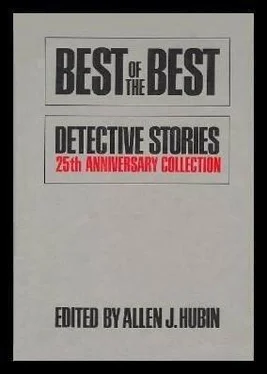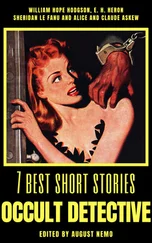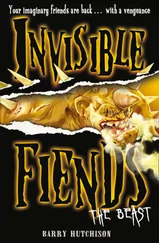Stephen Barr - Best of the best detective stories - 25th anniversary collection
Здесь есть возможность читать онлайн «Stephen Barr - Best of the best detective stories - 25th anniversary collection» весь текст электронной книги совершенно бесплатно (целиком полную версию без сокращений). В некоторых случаях можно слушать аудио, скачать через торрент в формате fb2 и присутствует краткое содержание. Город: New York, Год выпуска: 1971, ISBN: 1971, Издательство: E.P. Dutton & Co., Жанр: Детектив, на английском языке. Описание произведения, (предисловие) а так же отзывы посетителей доступны на портале библиотеки ЛибКат.
- Название:Best of the best detective stories: 25th anniversary collection
- Автор:
- Издательство:E.P. Dutton & Co.
- Жанр:
- Год:1971
- Город:New York
- ISBN:978-0-525-06450-3
- Рейтинг книги:5 / 5. Голосов: 1
-
Избранное:Добавить в избранное
- Отзывы:
-
Ваша оценка:
- 100
- 1
- 2
- 3
- 4
- 5
Best of the best detective stories: 25th anniversary collection: краткое содержание, описание и аннотация
Предлагаем к чтению аннотацию, описание, краткое содержание или предисловие (зависит от того, что написал сам автор книги «Best of the best detective stories: 25th anniversary collection»). Если вы не нашли необходимую информацию о книге — напишите в комментариях, мы постараемся отыскать её.
Best of the best detective stories: 25th anniversary collection — читать онлайн бесплатно полную книгу (весь текст) целиком
Ниже представлен текст книги, разбитый по страницам. Система сохранения места последней прочитанной страницы, позволяет с удобством читать онлайн бесплатно книгу «Best of the best detective stories: 25th anniversary collection», без необходимости каждый раз заново искать на чём Вы остановились. Поставьте закладку, и сможете в любой момент перейти на страницу, на которой закончили чтение.
Интервал:
Закладка:
Neely seated himself and took up a spiral notebook and a ballpoint pen. A scowl, or rather a pout, settled on his usually good-natured countenance.
First Granny coughed. Then she gagged. Then she inhaled with a harsh, gasping breath. Then she turned white, then green, then a bright red which might have startled and even alarmed Neely, had he not seen it all happen so often before. Presently she removed the pipe. Her face had taken on an almost masculine appearance. She rolled up one hand into a somewhat loose fist, then the other, then she placed one in alignment with the other and lifted them to her eyes and peered through her simulated telescope.
Neely, in a tone of voice obviously intended as mockery, or at least mimicry, said, “ ‘To arms, to arms! Blow der drums and beat der trumpet! De dumdam Engels ships ben gesailing up de River!’ ”
The eye which was not looking through the “telescope” now looked at him, and there was something cold and cruel in it. Neely’s own eyes fell. After a moment he mumbled, “Sorry, Oude Piet, I mean Oom Piet. I mean, darn it, Heer — um — Governor — ah — Your Highness.”
The eye glared at him, then the “telescope” shifted. After a while a heavily accented and guttural voice, quite unlike his grandmother’s usual tones, came from her throat and announced, in a businesslike drone, “Shloop by der vharf in Communipaw. Beaver pelts—”
Neely clicked his tongue in annoyance. “You’re in the wrong century, darn it, now!” he cried. Again, the cold old eye glared at him. But he stood his ground. “Come on, now,” he said. “A promise is a promise. What would the Com pany say?”
The “telescope” shifted again. The drone recommenced. “Pier Dvendy-Zeven — Durkish Zigarettes — Zipahi brand — watchman gedding dronk—”
Neely’s ballpoint scribbled rapidly. “ That’s the ticket!” he declared.
Daisy Smith finished the tunafish sandwich (no mayonnaise — a girl has to watch those calories every single min ute) and washed the dish. For dessert she had half a pear. Then the question could no longer be postponed — what was she going to do that evening. It had all seemed so simple, back in Piney Woods, New Jersey: she would take her own savings, all $80 plus the $500 or so, most of it in old-fashioned long bills, but including the $100 Liberty Bond, which had been found in the much-mended worsted stocking under Uncle Dynus’ mattress after his funeral (the note found with it — thise is four Dasi — seemed to make traffic with the Surrogate’s Court unnecessary), and come to New York. There she would find, in the order named, an apartment, a job, and Some-one-To-Go-Out-With.
She had found the first two without much trouble, but the third, which she had thought would proceed from the second, did not materialize. Her employer, Mr. Katachatourian, was the nicest old man in the world, but, though a widower, he was old ; somehow the importing of St. John’s bread — his business — didn’t seem to attract young men. And if, from time to time, with trepidation, he took a flyer on a consignment of sesame seeds, or pistachio nuts, it helped Daisy’s prospects not at all. The jobbing of sesame seeds, or pistachio nuts, attracted exactly the same sort of gentlemen as did the jobbing of St. John’s bread — either middle-aged and married, or elderly.
Once, to be sure, and once only, Daisy had made a social contact from her job. Mr. Imamoglu, one of the largest exporters of St. John’s bread on the eastern Aegean littoral, had come to New York on business, had dropped in to see his good customer. The Katachatourian Trading Company, and had immediately fallen in love with Daisy. With true Oriental opulence he took her out every night for a week. He took her to the opera, to the St. Regis, to the Horse Show at Madison Square Garden, to Jack Dempsey’s restaurant, to a Near Eastern night club on Ninth Avenue, to Hamburger Heaven, to a performance of Phèdre in the original French, to the Bowery Follies, and to a triple-feature movie house on 42nd Street which specialized in technicolor Westerns, of which Mr. Imamoglu was inordinately fond.
Then he proposed marriage.
Well, the prospect of living in a strawberry-ice-cream-pink villa in the fashionable suburb of Karsiyaka across the picturesque Bay from the romantic port of Izmir, where she would be waited on, hand and foot, by multitudes of servants, did appeal to Daisy. But although Mr. Imamoglu assured her that both polygamy and the harem were things of the past in Turkey, that, in fact, neither veil nor yashmak could be procured for love or money in all his country, still, you know, after all . And furthermore, Mr. Imamoglu was somewhat on in years; he must have been in his thirties.
And besides, she didn’t love him.
So Daisy said No.
The departure of the semidisconsolate exporter left Daisy’s evenings emptier than before. Go to church? Why, bless you, of course she went to church, every single Sunday, sometimes twice, and met a number of young men who played the organ or were in the choir or conducted a Sunday-school class. Most of them lived in the YMCA and were careful to explain to Daisy that it would be many, many years before they could even begin to think of marriage; and their ideas of a social evening were quite different from Mr. Imamoglu’s; they would arrange to meet her somewhere after supper and then go to a free illustrated lecture on the Greenland missions; followed by a cup of coffee or a coke, followed by a chaste farewell at the subway kiosk.
Sometimes a girl thought she might just as well be back in Piney Woods, New Jersey.
What, then, to do tonight? Wash her hair? Watch TV? Catch up on her letters? Mending? Solo visit to a movie? She decided to take a walk.
A few blocks from her apartment she saw a familiar trio leaning in familiar stances against a wall. They nudged one another as they saw Daisy coming, as they had the first time and as they did every time. By now she knew there would be no wolf whistles, no rude proposals.
“Good evening, miss.”
“G’ evening, miss.”
“Evening, miss.”
“Good evening,” Daisy said, pausing. “Oh, look at your new hats!” she exclaimed. “White fedoras. My goodness. Aren’t they nice.”
The three men beamed and smirked, and readjusted their brims. “All the big fellows wear white fedoras,” said the leader of the trio, whose name was Forrance.
“The big fellows?”
“Sure. Like on that, now, TV show. The Unthinkables. Al — Lucky — Baby Face — you know.”
As Forrance mentioned these people his two associates pursed lips and nodded soberly. One was quite small and suffered from nosebleeds. (“Must be a low pressure area comin’ down from Canada,” he would mumble; “I c’n alwees tell: Omma reggella human brommeter.”) He was known, quite simply, as Blood.
His companion, as if in compensation, was obese in the extreme. (“A glanjalla condition,” was his explanation; he indignantly denied gluttony. Taxed with overeating, he pleaded a tapeworm. “It’s not f’ me ,” was his indignant cry, over a third helping of breaded pork chops and French fries; “it’s f’ the woim!”) Not unexpectedly he was called Guts. Now and then he pretended that it was an acknowledgement of personal courage.
“Al?” Daisy repeated. “Lucky? Baby Face? White fedoras? The Unthinkables? But you’re not gangsters? ” she burst out. “ Are you?” For, as often as she had seen them, she had never thought to ask their trade.
Forrance drew himself up. Blood slouched. Guts loomed. A look of pleased importance underlay the grim look they assumed at the question. “Listen,” Forrance began, out of the side of his mouth, an effect instantly spoiled by his adding, “miss.”
Читать дальшеИнтервал:
Закладка:
Похожие книги на «Best of the best detective stories: 25th anniversary collection»
Представляем Вашему вниманию похожие книги на «Best of the best detective stories: 25th anniversary collection» списком для выбора. Мы отобрали схожую по названию и смыслу литературу в надежде предоставить читателям больше вариантов отыскать новые, интересные, ещё непрочитанные произведения.
Обсуждение, отзывы о книге «Best of the best detective stories: 25th anniversary collection» и просто собственные мнения читателей. Оставьте ваши комментарии, напишите, что Вы думаете о произведении, его смысле или главных героях. Укажите что конкретно понравилось, а что нет, и почему Вы так считаете.












